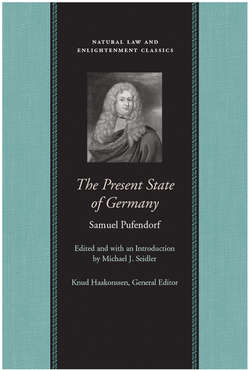Читать книгу The Present State of Germany - Samuel Pufendorf - Страница 12
На сайте Литреса книга снята с продажи.
ОглавлениеPREFACE TO THE SECOND EDITION (1706) 1
To the Benevolent Reader, Greetings
This small book lays aside its mask now that the author has been removed from human affairs and no longer fears men’s hatreds. It was written in an impulse of indignation when a professorship which the author believed he deserved was snatched away by another.2 Its publication followed the assessment and approval of the prince whom the author then served, and whose views and feelings are here and there expressed [in it].
In its youthful boldness, the work did not weigh sufficiently how dangerous it is for a private person to criticize the powerful. So later, in his maturer years, the author reviewed the book and expunged from it the things included there by a different sentiment, or without sufficient forethought, and elided here and there, by changing a few words, some things to which others had objected. It [also] seemed appropriate to omit the things that had been added toward the end of the book concerning religion,3 because that argument was more extensively and forcefully developed afterwards in the author’s other writings.4 For the work’s chief aim was to inquire about the form of the German republic,a whose irregularity will be the more easily acknowledged the more deeply one sees how this vast mechanism [machina] is governed.
The author initially published the book under a fictitious name because, even though the Palatine censor approved of the work in itself, he nonetheless recommended that it be printed elsewhere. It was therefore sent to the author’s brother, Esaias Pufendorf, then the Swedish charge d’affaires at the French court. When the latter had given it to a certain typographer to be printed, a proofreader caught the words, in [Ch. I] §.3, “the inappropriate conceit of certain Frenchmen,” and had it submitted to the noted historian, Mézeray,5 for review. Since the latter did not dare to approve its printing in Paris, it was published soon thereafter by Adrian Vlacq at The Hague, without a scruple. It is worthwhile here, however, to append Mézeray’s judgment.
